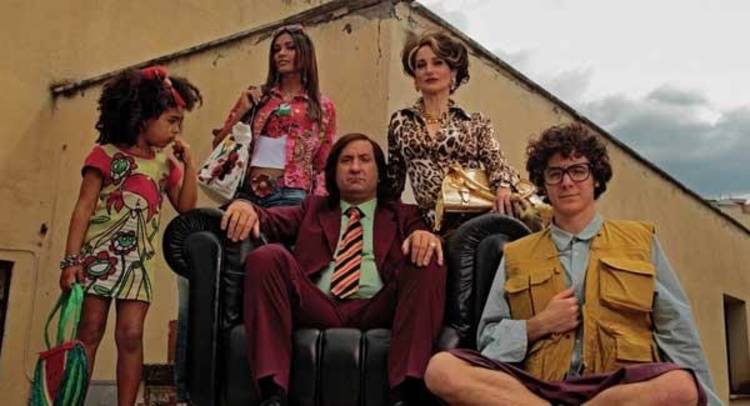


p { margin-bottom: 0.08in; }
The "Open Roads: New Italian Cinema" festival is at its 11th edition. It takes place in New York, this year from June 1-8. Its objective is to promote the latest Italian cinematic productions to the American public.
p { margin-bottom: 0.08in; }
Sixteen films will be featured this year: “1860” by Alessandro Blasetti, “1960” by Gabriele Salvatores: “20 sigarette”(20 Cigarettes) by Aureliano Amadei; “La bellezza del somaro” (Love and Slaps) by Sergio Castellitto, “Figli delle Stelle” (Unlikely Revolutionaries) di Lucio Pellegrini: “Il primo incarico” (The first assignment) by Giorgia Cecere; “Sorelle Mai” by Marco Bellocchio; “Baci Mai Dati” (Lost Kisses) di Roberta Torre; “Sul mare” (On the Sea) of Alessandro D’Alatri; “La passione” (The Passion) by Carlo Mazzacurati; “Fughe e approdi” (Return to Aeolinan Islands) by Giovanna Taviani; “Gianni e le donne” (The Salt of Life) by Gianni di Gregorio; “La solitudine dei numeri primi” (The Solitude of Prime Numbers) by Saverio Costanzo; “Noi Credevamo,” (We Believed) di Mario Martone; e “La donna della mia vita” (The Woman of My Life) by Luca Lucini.
I-Italy had the opportunity to interview Antonio Monda, professor of film at New York University and one of the two Artistic Directors of the festival.
Open Roads is at its 11th edition. Have you recorded an increase in the interest towards Italian cinema in America?
Absolutely. I am happy that these screenings create dialogue with an international public, especially from New York, since on an average, 60-70% of the public is American.
This year's films seem to have been chosen with a particular social interest. What criteria were followed in making these choices?
Yes we have movies such as 'Qualunquemente' or Marco Bellocchio's documentary "Sorelle Mai" - which substituted "Il gioiellino", previously on the billboard - that feature important readings of the social reality of Italy, today. However, the criteria in selecting are always related to the quality of the cinematic product: we don't choose a theme over another. We can't avoid noticing that some of the best Italian films of today are particularly relevant to social themes.
Which aspect of Italy do you believe strikes the American public most?
Italian regionalism continues to be featured a lot, considering for example Giovanna Taviani's documentary on the Aeolian Islands; many movies are filmed in different cities. There is also a particular attention to history, coinciding with the 150th anniversary of the Italian unification - for instance in Mario Martone's "Noi Credevamo". These are the main aspects, because the allow us to understand the past and the local aspects so we can better understand Italy in general.
What difficulties do these films encounter after the festival in attempting to obtain an American distribution?
Two or three of the thirteen or fourteen movies featured in the festival are then distributed, so about one out of six. Obviously the objective, the intention, and the passion of all of us involved, is to reach three or four per year. Every year we organize a lunch with the distributors, to encourage them, and have them meet the directors personally, to make them fall in love with the works and get them to buy the proposal.
Do you believe there are great differences between Italian and American cinema?
Surely. I don't mean differences in quality, because our cinema is quite healthy qualitatively. American cinema has also demonstrated a great capacity towards innovation lately, a sign of intellectual courage and strong spiritualism.
Monda remains super partes when we ask him: which among this year's films will be more successful?
I support all of them equally. I am proud of the variety: from documentary to historic film, from a generational movie to a comedy, I can't choose one, I can only invite everyone to participate in the festival.
It is up to us, then, to follow this year's Open Roads which seems filled with interesting proposals.
On Tuesday May 31st the Italian Cultural Institute of New York is hosting a Round Table on “Cinema Made in Italy between new tax incentives and new talents” [2]. Speakers include Roberto Cicutto – President of Cinecitta’ Luce-FilmItalia, the producers Rose Ganguzza, Gene Kelly, Marco Valerio Pugini, and Michael Young, Director of New York Film Academy.
On June 3rd the Casa Italiana Zerilli-Marimò [3]will meet the protagonist of the festival: p { margin-bottom: 0.08in; }
Antonio Albanese (Actor, Whatsoeverly), Marco Giallini (Actor, Love and Slaps), Alba Rohrwacher (Actress, The Solitude of Prime Numbers), Giorgia Cecere (Director, The First Assignment), Alessandro d’Alatri (Director, On the Sea), Luca Lucini (Director, The Woman of My Life), Mario Martone (Director, We Believed), Carlo Mazzacurati (Director, The Passion), Lucio Pellegrini (Director, Unlikely Revolutionaries), Giovanna Taviani (Director, Return to the Aeolian Islands
For more information about screenings and ticketing, visit http://www.filmlinc.com [4]
Source URL: http://test.iitaly.org/magazine/focus/art-culture/article/open-roads-11th-edition-interview-antonio-monda
Links
[1] http://test.iitaly.org/files/qualunquemente1306869717jpg
[2] http://www.iicnewyork.esteri.it/IIC_NewYork/webform/SchedaEvento.aspx?id=527&citta=NewYork
[3] http://www.casaitaliananyu.org/
[4] http://www.filmlinc.com/films/series/open-roads-new-italian-cinema